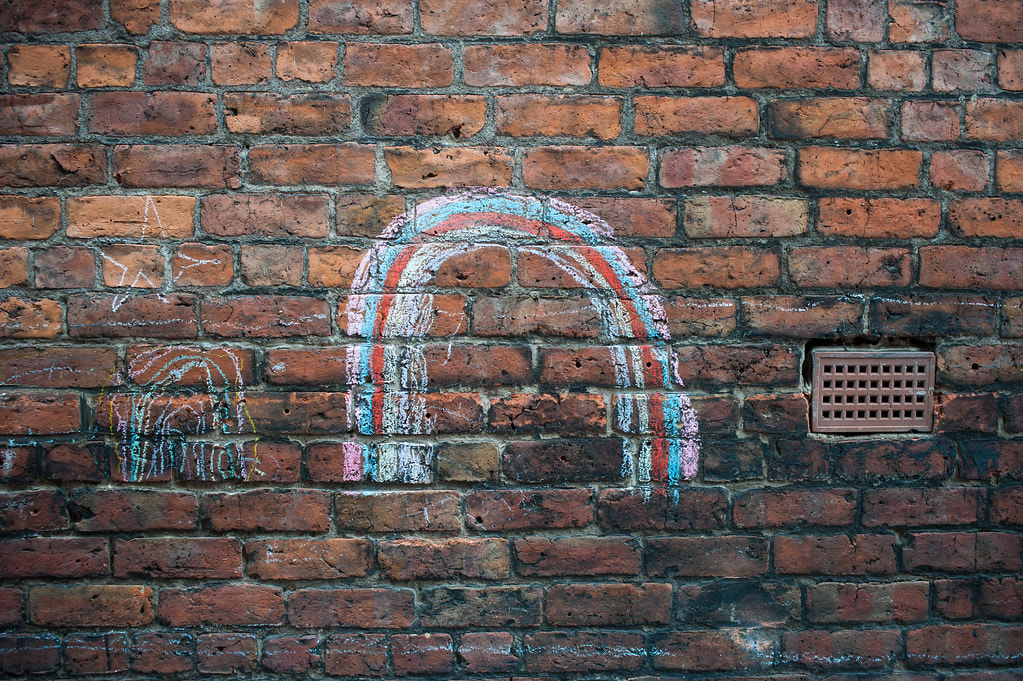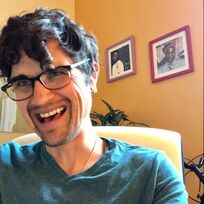|
by finn schneider In the spaces and communities that contextualize my being and doing, the proliferation of rainbow flags and symbols during the month of June has become a familiar ritual, the marking of a season of sorts. Pride month, in my experience, is a season of paradox; ripe with contradiction and characterized by tension if we are willing to dig just a bit below the shiny surface. Designating June in this regard invites the learning of LGBTQ+ history, a practice which is important not just for those of us who are queer and/or trans. Many of us associate Pride Month as commemorating the Stonewall riot, a collective uprising against police violence in New York that culminated from a series of protests led by BIPOC drag queens and transwomen. This courageous act of resistance is often understood as the start of the LGBTQ+ movement, and yet it is one of countless such efforts to interrupt state violence directed at queer and trans people. How does uplifting a singular (and often white-washed) story of resistance contribute to the consolidation of an extraordinarily diverse and diasporic grouping of people and histories? I was well into my 20s and exploring my identity as a trans person when I learned about Compton’s Cafeteria riot, an uprising led by trans women and sex workers in the Tenderloin district of San Francisco who were being targeted by police violence. Compton’s Cafeteria riot predated Stonewall by three years and yet remains largely unknown in mainstream understandings of LGBTQ+ history in the U.S. What happens when we become attached to a particular historical narrative as representing an entire grouping of people marginalized on the basis of gender and sexuality, and perhaps even feel proud of ourselves for being aware of that particular narrative? Whose histories are lost, or intentionally invisibilized? How does designating a particular month as the time within which we reflect on particular histories set us up to believe that such reflection and learning ought not be an ongoing practice? Pride month asks us to become educated about and commemorate stories of struggle and resistance and resilience; this is important work. At the same time, this call to gain knowledge paradoxically contributes both to the flattening of complex, varied histories, as well as to the belief that we can and ought to be able to know and understand “the Other” on our own terms and through our own frameworks. Pride month invites celebration of difference and designates time and space for joy, revelry, community, and solidarity among LGBTQ+ people and those who love and affirm us. To me, as a queer and trans UU, these are practices of faith and expressions of covenant rooted in our belief in the inherent worth and dignity of every person and the interconnected web of all existence of which we are a part. In other words, the season of Pride invites life-giving and community-building practice. Herein lies another paradox. While collectively enacted, Pride month is imagined through configurations of individual identity and individual rights frameworks. What opportunities and challenges come with imagining gender and sexuality primarily through the framework of personal identity? As an expression of our faith, we must and will continue fighting for the rights of self-expression, futures free from violence based on real or perceived identity, and equitable access to societal resources and institutions. At the same time, there is sacrifice inherent in centering and leveraging individual, identity-based, rights-focused approaches to working toward transformational justice. Visibility, for example, is often equated with progress in relation to LGBTQ+ people and issues. Undoubtedly, increased visibility has played a significant role in shifting hearts and minds toward greater societal acceptance in recent decades. Visibility, however, is not harmless; nor is it accessible to or desired by all LGBTQ+ people symmetrically. The focus on personal identity at the heart of Pride month and central to mainstream change-making efforts has resulted in meaningful societal progress for many LGBTQ+ people and groups; it has also come with a cost. As a practice of faith formation, how might we complicate our engagement with gender and sexuality by thinking critically, collectively, and generatively about the ways that our UU tradition both limits and expands our thinking, doing, and being? Pride month, and the abundance of rainbow flags that mark its arrival in my corner of St. Paul, is layered and complex for me. One of the many things I appreciate about queer frameworks and ways of being is their capacity for engaging paradox productively. Many moments of my life are characterized by navigating in-between spaces, never quite fitting in easefully. Even while such navigation brings with it exhaustion and sometimes hurt, I do not seek easy resolution. Engaging paradox has grown my capacity to see the world and other beings with complexity and expanded the ways in which I feel connected to holy mystery. It is my hope that we, as members of Unity Church, will deepen our covenantal commitment and collective faith formation practices through exploring and engaging contradiction and paradox.
Image: "Rainbow Bridge" by HelenHates Peas is licensed under CC BY-NC 2.0
0 Comments
Leave a Reply. |
Topics
All
Beloved Community ResourcesUnity Justice Database
Team Dynamics House of Intersectionality Anti-Racism Resources in the Unity Libraries Collection Creative Writers of Color in Unity Libraries The History of Race Relations and Unity Church, 1850-2005 Archives
July 2024
Beloved Community Staff TeamThe Beloved Community Staff Team (BCST) strengthens and coordinates Unity’s antiracism and multicultural work, and provides opportunities for congregants and the church to grow into greater intercultural competency. We help the congregation ground itself in the understanding of antiracism and multiculturalism as a core part of faith formation. We support Unity’s efforts to expand our collective capacity to imagine and build the Beloved Community. Here, we share the stories of this journey — the struggles, the questions, and the collaborations — both at Unity and in the wider world.
The current members of the Beloved Community Staff Team include Rev. Kathleen Rolenz, Rev. KP Hong, Rev. Lara Cowtan, Drew Danielson, Laura Park, Lia Rivamonte and Angela Wilcox. |

